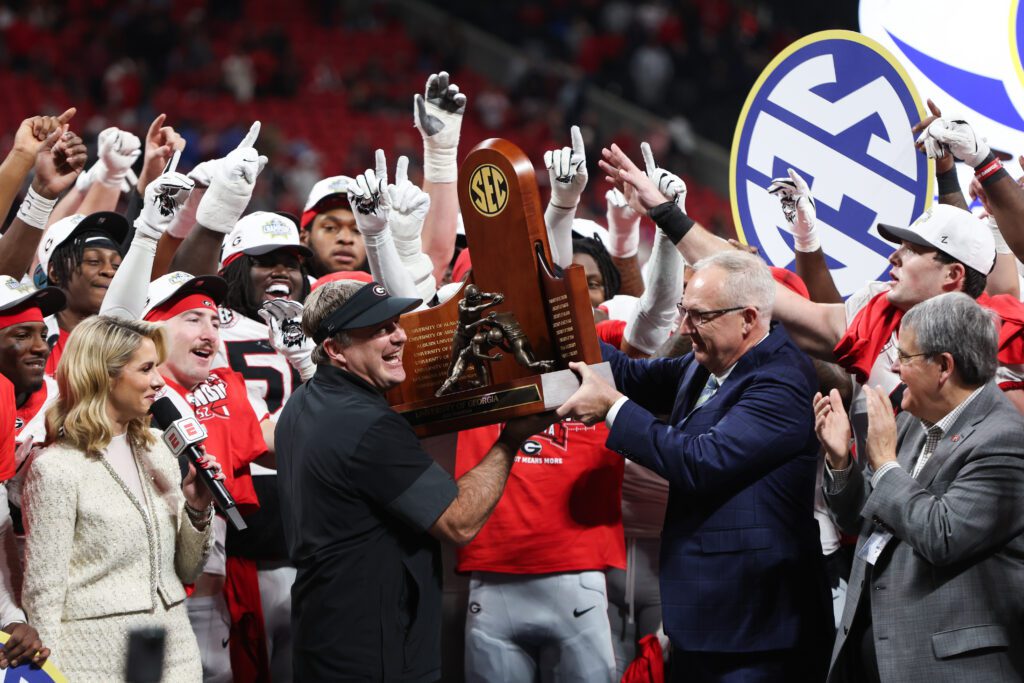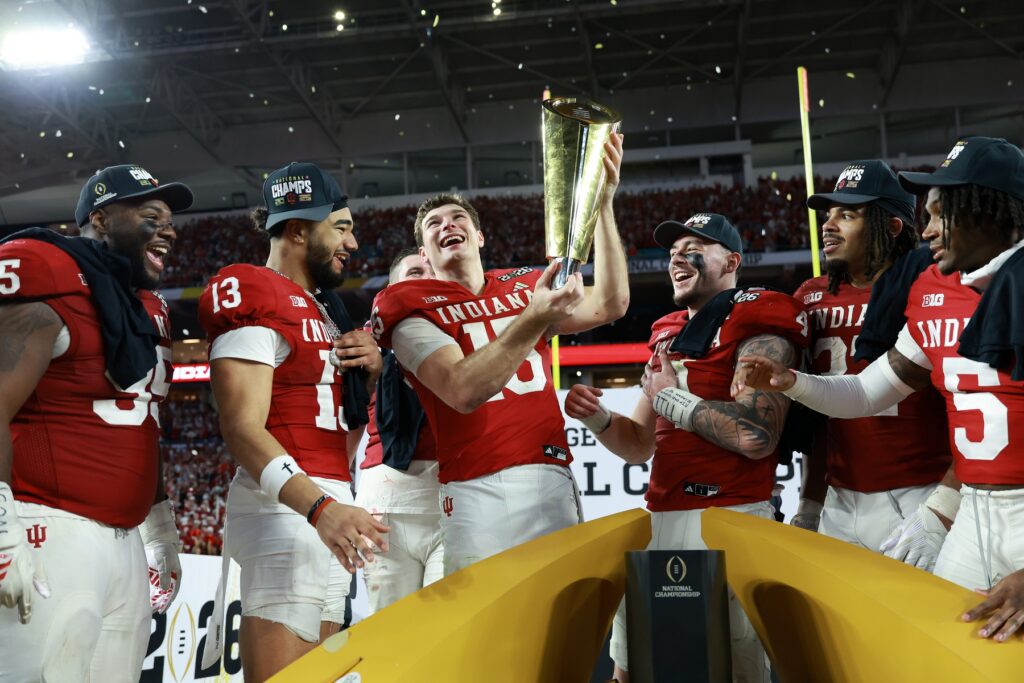It’s been announced that College Football Playoff expansion is happening! In its current form, just the top four teams in the final CFP poll play for a shot to win the National Title. By 2026 at least — and, quite possibly as early as 2024 — college football will have a seemingly more legitimate playoff format, according to some
There are strong, strong opinions on both sides of this argument. However, the eventual College Football Playoff expansion is a bad thing for the sport as a whole.
College Football Expansion is a BAD Thing
More Blowouts Guaranteed
The biggest argument against the idea of College Football Playoff expansion is that there will be more blowouts. The talent gap between the best teams and the rest is just too great. Ohio State, Alabama, and Clemson have won the CFP at least once and each has been boat raced out of the stadium at least once. What’s going to happen when an at-large three-loss team has to run it back against a team they already lost to, 49-10?
The CFP has been around for nine seasons already. The average margin of victory in the semifinals is 19 points. That’s just 1v4 and 2v3. Of the 18 games that have been played, only five have been decided by one score (two of those were in 2022). In the National Championship, the average margin of victory is even higher at 20 points. That includes the 65-7 Georgia put on TCU last year. Again, only three games have been decided by one score, none since the 2017-18 classic between Alabama and Georgia that ended 26-23.
Upsets can happen, sure, but more often than not, there will be more 38-0, 55-10 drubbings of less-talented teams. Think of a year where Alabama does not win the SEC and earns an at-large bid as a 12-1 team. They’ll get to travel to, likely, the worst P5 or best G5 champion. Do you think that an Alabama team fresh off a loss is going to lose to whoever the Sun Belt sends?
Blueblood Benefit of the Doubt
Of the 12-team playoff, six will be automatic bids for the top six conference champions. That means that six at-large bids are up for grabs. Alabama and Ohio State will never miss the CFP barring four losses.
The thing is, even with the four-team playoff, bluebloods already get the benefit of the doubt. In 2016, a non-division winner Ohio State made the playoff over the Big Ten Champion, Penn State, who beat them head-to-head. In 2017, non-division winner Alabama made the CFP over Big Ten Champion, Ohio State. Heck in 2020, Ohio State with just six wins made it over two highly-ranked and undefeated G5 champions as well as red-hot Big 12 champion, Oklahoma.
I say this as an Ohio State fan, of course.
The thing is, if you have the brand and fewer than three losses on the year, you’re in. This year, Michigan could lose to Penn State and Ohio State, the only two decent teams on the schedule, and be peachy. They could even lose to Michigan State and manage to squeak in a 12-team CFP.
Teams like Alabama and Ohio State will never miss another CFP. Teams like Texas, Notre Dame, Michigan, USC, and Oklahoma will get the benefit of the doubt over other programs. Even borderline teams like Tennesee, Georgia (historically…obviously they are the best team in the nation in 2022), Nebraska, Clemson, or Florida State will benefit.
Higher Chance of Rematch
Everyone clamors for rematches until their team is involved in one. Even with the four-team set, there have been rankings manipulation to avoid a rematch in the semifinals.
A good example of this was in 2020. It was Alabama, Clemson, Ohio State, and Notre Dame. Realistically, Clemson avenged its lone loss (albeit that loss was without Trevor Lawrence in a close game) to Notre Dame in the ACC Championship in dominant fashion. There was a strong argument that they should have jumped Alabama to the one seed. However, that would result in Clemson vs Notre Dame, round three.
Most of the top 12 teams will have played each other within their conference. Ohio State plays Penn State and Michigan yearly. Alabama plays [insert random overinflated three-loss SEC East team here] and then whoever the SEC Championship that ends up highly-ranked.
Sure, having Ohio State and Michigan play again for a chance for the natty is great headlines, but that’s not ideal. It just adds more asterisks to the game. If Auburn beats Alabama in the regular season and goes undefeated but loses to the Tide in the CFP, who is truly better? They’re 1-1. At the same time, if Oklahoma beats Baylor in the regular season, Big 12 Champion, and again in the CFP, what’s that prove? The Big 12 shouldn’t have an at-large team?
The unfamiliarity is the most exciting part of the bowl season. Of course, when the same few teams make it in the four-team format, there is familiarity. However, teams change from year to year. LSU in 2019 wasn’t anything like LSU in 2020.
For the Most Part, the Regular Season Means Less
Unlike the coach across from him in the CFP, Dabo Swinney is not in favor of College Football Playoff expansion. pic.twitter.com/5vEeI0tHKB
— Paul Finebaum (@finebaum) December 17, 2018
Upsets in the regular season are some of the most exciting things in college football: Iowa and Purdue doing the unthinkable and royally smashing Ohio State; Penn State losing to Pitt; all of the Group of 5 over Power 5 upsets like Appalachian State over Texas A&M last year. College Football Playoff expansion eliminates the sense of urgency week to week.
As we said in the “why it’s good” segment, out-of-conference scheduling could either get stronger because a loss doesn’t kill a season or could get worse…because a bad loss may not kill a season.
Every year leading up to the CFP expansion, every game matters. The margin for error is slimmer. In the BCS era, it was razor-thin. By allowing, potentially, three-loss teams to the party, that sense of urgency is minimized. A team like Kentucky could get embarrassed by Georgia and lose another SEC game but still make it with wins over nobodies. Even the Pac-12 and its near-non-Power status could sneak another team in if all they did was lose badly to the champion.
The regular season will always have weight, obviously. However, by expanding and allowing eight more teams into the CFP, you open the door for very mediocre programs. A two-loss Utah team would have had an automatic bid last year. Same with two-loss Pitt. Two-loss Michigan State would likely have gotten the nod despite having the worst secondary in the nation and allowing Ohio State to score what felt like 100 points in the first half.
More Games, More Injury Risk
If we are going to expand the CFP and potentially make these athletes play 17 games, something else will have to change. That’s 17 games for 18-22ish year-olds. “Oh, well the NFL plays 17 games before playoffs!” True, but the NFL is full of guys paid millions, are the best in their fields, and have a union or higher power watching over to protect them. What about the guys who are lucky to have scholarships who get thrust into the spotlight in Week 1 and have no chance of the NFL?
The overwhelming majority of college football players will not make it to the NFL. This is as good as it gets. We talked about opt-outs in the last piece. Athletes opt out of meaningless bowl games to protect themselves from injury and possibly save millions. Now, they can’t do that. No self-respecting football player will quit his team ahead of a College Football Playoff game.
Even though some players are getting lucrative NIL deals — which, if they are, good for them — most are just flying with the scholarship. That scholarship and/or NIL deals could go away with an injury due to too much playing. If the NCAA cared as much as they say they do, they either chop a week off of the regular season or expand it with a second bye week. These are college kids we are talking about. Even if their strength and conditioning programs are strong, this could get to be too much.
It Won’t Be the 12 Best Teams
Is it just me…or are 95% of the playoff expansion advocates from programs who haven’t touched the CFP? pic.twitter.com/oVhmIqnSbL
— Alex Ansted (@AlexAnstedCFB) July 29, 2022
Finally, the 12 best teams. If the CFP was solely teams ranked 1-12 in the final CFP rankings, fine. But it’s not. It will be the six highest-ranked conference champions and six at-large. In reality, it may be nine or 10 of the best teams and two or three meh conference champions.
The reality is this: it’s the BCS with a little sparkle. The BCS got flak for having AQ teams. On 19 occasions, a team ranked worse than 12th earned a BCS invite. And that’s just five games and ten teams! The worst part is that in the 2010-11 season, unranked UCONN earned an AQ bid for winning the Big East and in 2012-13, unranked Wisconsin earned an AQ bid for winning the Big Ten (thanks to 12-0 Ohio State being bowl banned).
In the CFP era, it would be good to look at the NY6 bowls since that’s 12 teams. 11 times in the nine years it’s been around teams ranked worse than 12th earned an NY6 invite. Obviously, the formula will be different; 24th-ranked Virginia won’t earn a CFP bid simply because they are the highest-ranked ACC team after Clemson.
Will the sixth-best conference champion be one of the 12 best teams in the nation? More often than not, no. Especially not when you consider that the Pac-12 is losing USC (and UCLA, I guess) and other conferences have been eyeing the remaining programs.
When a two-loss P5 team whose only losses were to top-five teams misses out in favor of a 23rd-ranked Conference-USA champion, log off Twitter for the night. The fact of the matter is that the way that it’s set up continues to breed controversy. There will always be a TCU/Baylor/Ohio State 2014-style debate.
This Will Get Ugly
College Football Playoff expansion is not going to solve the issues that lie within college football. While teams who get hot at the end of the year will have a shot now, the brand will always win. TV ratings are not the greatest for the current system with so many blowouts and uninteresting matchups. Now we want to invite eight more teams? Many of whom likely don’t even belong on the same field as the contenders?
College football is changing. It’s not going back. Hopefully, we can perfect this change, or else all Hell will continue to break loose.
Main Photo:



